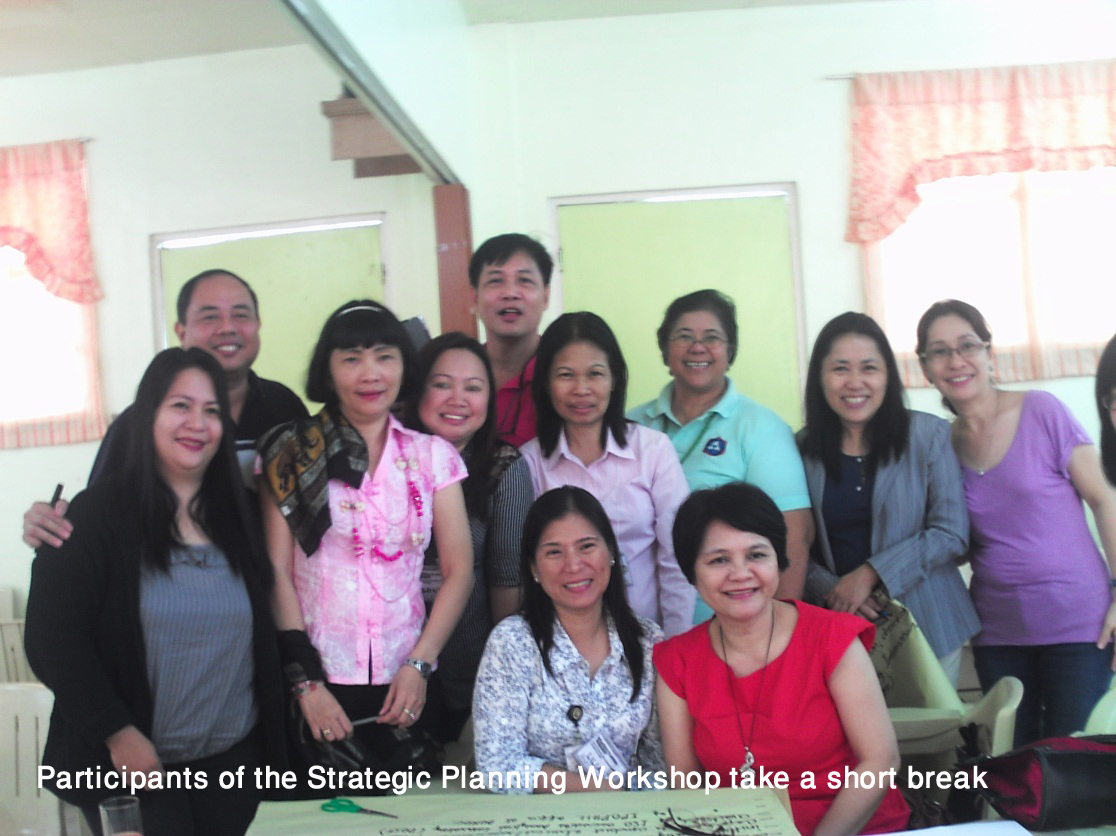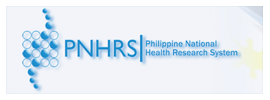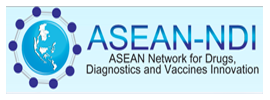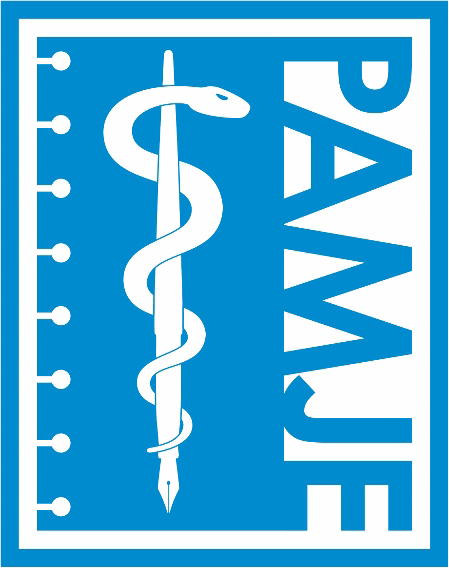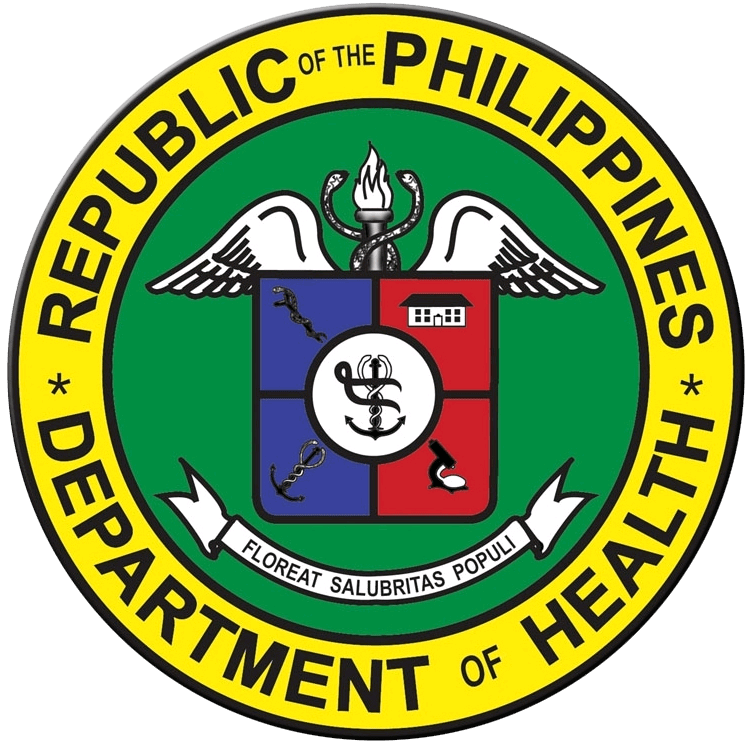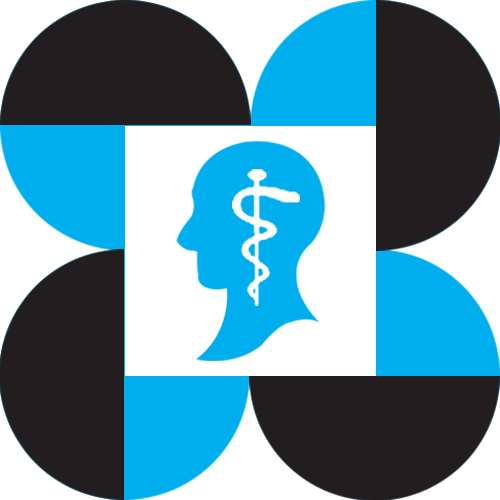The Bicol Consortium for Health Research and Development conducted a Strategic Planning Workshop last October 9-10, 2012 at the Bicol University College of Nursing, Legazpi City. The objective of the workshop was to 1) identify and understand the BCHRD’s internal and external environment, including the major trends and events affecting it; and 2) generate/formulate a shared Vision, Mission, Goals/Objectives and Strategies for the BCHRD within the next 3 years.
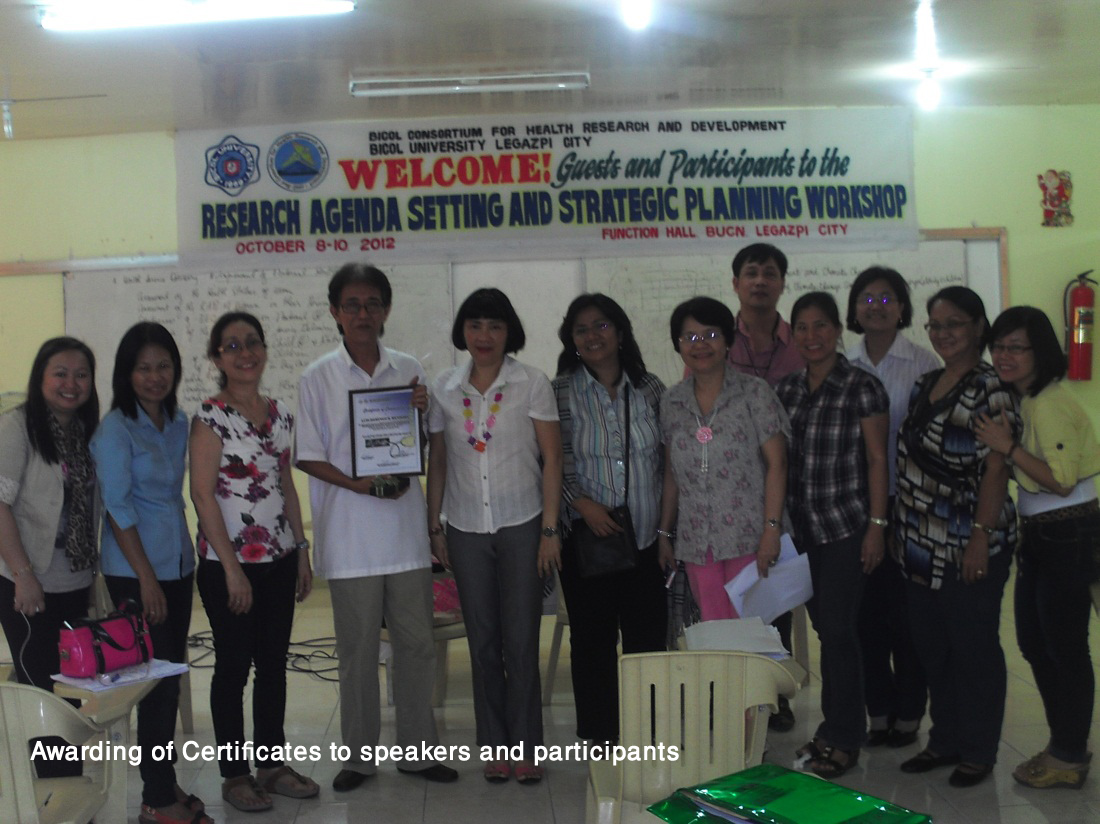
The activity was facilitated by Engr. Ellen P. San Juan, President & Managing Director of Transformation OptimizerProfessionals Inc. A total of thirteen (13) member agencies participated and came up with the Vision, Mission, Goals, Objectives, CoreValues, and the SWOT analysis for the operation of the consortium. The output of the workshop was as follows:
Vision: We are a nationally recognized from prime mover of excellent health and health related researches responsive to the needs of the Bicolanos towards improved quality of life.
Mission: We are a consortium of committed research institutions that produce quality health researches adhering to the highest ethical standards by collaborating with stakeholders and building the capacity of the researchers in the Bicol Region.
Goals:
1. Quality of Researchers: enhancement of researchers’ capacity and capability
2. Researches: undertake quality health and health related R & D activities
3. Recipient of various institutional awards from recognized award-giving bodies.
4. Establishment of linkages between and among S &T / R & D networks.
5. To produce quality researches that will improve the health conditions of Bicolanos.
6.To establish a dynamic, innovative, and collaborative organization that upholds good governance.
Specific Objectives:
- To increase the number of competent researchers by at least 3% in 3 years.
- At least 3 completed collaborative researches.
- To publish 3 completed research in peer reviewed journals.
- Come up with 9 approved quality health researches and receive at least 3 major awards from recognized award-giving bodies: (PNHRS, CHED Zonal Research Center, CHED- NHERA, and FNRI)
- Establish and strengthen linkages between and among Research and Development / Science & Technology networks.
- Produce one health research program on Maternal and Child Health and Nutrition for implementation of concerned institutions.
- Increase the number of member institutions by 50 per cent.
Core Values
- Commitment
- Integrity
- Innovativeness
- Respect
- Teamwork
Strengths
1. Internal Strengths
a. Increased number of committed member institutions/ agencies
b. Strong research capabilities of member institutions/ agencies
c. Basic training programs in place
d. Desire to make committees functional
e. Drafted research priorities for the region
f. Initial re-alignment of R & D’s with the NUHRA by some member institutions.
g. Capability to conduct clinical/ experimental researches.
h. Availability of ISO accredited Analytical Laboratory ( DOST )
i. Availability of IPOPHIL office at BURDC
j. With ongoing inventory of researchers, researches, and their training needs
k. Strong commitment of member institutions
l. Well-defined mission and vision
m. Well-established research department with member institution
n. ISO-accredited RDC of the base institution - Bicol University
o. Expanding membership from 5 to 15.
p. Committed pool of researchers (multidisciplinary with ISO accreditation)
2. External Opportunities
a. Wide S & T networks
b. More funding institutions (e.g. DOST central office, JICA, WHO, UNESCO, UNICEF, FAO, KOIKA, AECID, National and Local Government agencies)
c. Supportive partner institutions
d. Develop in-line linkage with international institutions like hospitals and universities (E-Libraries)
e. Bilateral Cooperation between BCHRD & institution abroad - exchange researchers
f. Existence of PCHRD scholars’ society
g. Strong support of the government (RA 8503 and HB 564)
h. Regional economic growth of 26%
i. Liberalization of the telecommunication industry
j. Technology transfer
k. Access to seminars trainings in and out of the country
l. Good governance (LGU’s receptive to research undertakings and utilization of research findings)
Threats
1. External
a. Priority program of Government (National Local)
b. Lack of support from private hospitals in conducting research and implementation of research outputs
c. Problems in peace and order situation
d. Inaccessible research settings
e. Lack of support from External Funding Institutions
f. Lack of awareness and support from the community
a. Change of government due to elections, priorities/ agenda, funding, mechanism, choice of people (cabinet, etc.)
b. Pressure / enforcement by international groups
c. World trend (can’t cope)
g. Undefined linkage between health researchers, policy makers, health program developers, and practitioners
h. Region 5 unemployment rate of 37.7% as of July 2012
i. Increase in population (2.7%)
j. Magnitude of poverty
k. Social development challenges
l. High percentage in terms of not meeting family planning needs of the region
2. Internal (Areas of Improvement)
a. Minimal research output
b. Low level of information dissemination and utilization of research output
c. Low level of interest to conduct research
d. Absence of strategic direction and long term development plan
e. Limited resources (manpower, financial constraints, etc.)
f. Absence of office and other facilities
g. Internal policies that restrict the consortium operation
a. Institutionalization not yet realized
b. BCHRD Operations with reference to base agency/ member institutions, office, financial management, other support services
h. Lack of skills among members of respective departments of member institutions
